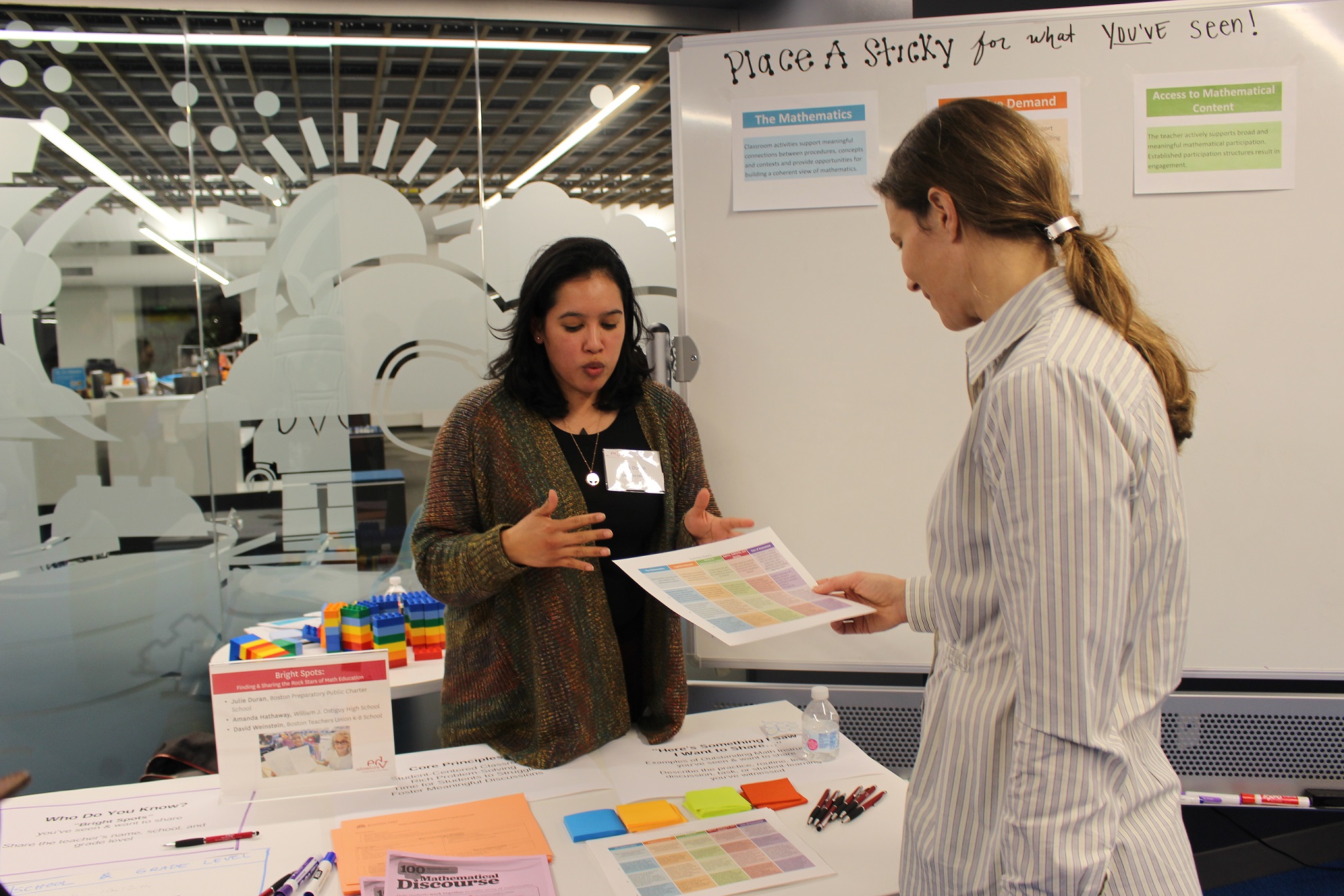Research & Insights / Math Fellows Forum – Targeted solutions to improve math outcomes
Math Fellows Forum – Targeted solutions to improve math outcomes

The 2018 Math Fellows invite you to learn about the solutions they’re pursuing to improve access to high quality math education across Boston. Connect with educators who are passionate about supporting all students, creating a culture of math in schools and wider communities, and breaking down barriers to professional learning among peers. Specifically, you’ll learn about:
- A helpful resource sharing best practices for implementing interventions in classrooms,
- A project currently underway in several Boston schools to combat the commonly-heard phrases: “I’m not good at math” and “It’s too hard”
- A low-cost coverage approach allowing teachers to attend professional development with their teams during the school day while ensuring students don’t miss valuable math learning opportunities
Attention Attention: Math-ervention!!
By Aadina Balti, Mason Pilot School; Katy Briggs, McKay K-8 School; Kayla Hoff, Henderson K-12 Inclusion School; Caitlin O’Brien, Edison K-8 School; Jara Richards, Conservatory Lab Charter School; Jeremy Scott, UP Academy Holland; Gina Sheehan, Fenway High School
As educators, it is our ultimate goal to watch all students be successful. Many teachers have found that the time we have in our math classrooms is not enough to provide the opportunity for all students to succeed, particularly those who need the most support. More schools are providing additional time for teachers to support our highest-needs students through intervention periods. However, many teachers struggle to incorporate intervention in the busy day. Some schools have intervention blocks built into the schedule, while others do not. Some teachers have additional support staff in their classrooms, while others do not. Even with the schools that are fortunate to have intervention blocks built in, teachers may not know what to do with that time. There is no one size fits all intervention.
Our website provides support for how to best implement an intervention in your classroom, based on your needs. Depending on what your structure looks like, our site provides guidance for physical layout, how to best utilize other teachers/staff, how to keep all students engaged, and resources to best help your interventions reach all students. For each model, find sample lesson plans, pros and cons to consider, and helpful hints. Our hope is that this site can be a resource to help you structure and implement your interventions, to best support all students in your math classrooms.
Everybody Does Math
By Cleata Brown, Mission Hill K-8 School; Viergeline Felix, KIPP Academy Boston; Enkeleda Gjoni, Boston International High School
Educators, here is your problem: You frequently hear the words, “It’s too hard” or “I am not good at math” in your classroom. You struggle to find problems that are both engaging and accessible. You think to yourself, “I have no time to make math fun for my students,” Families, you often think “This new math is different from how I learned it in school, and I don’t want to confuse my kid.” We have your solution: EVERYBODY DOES MATH. Everybody Does Math is a 3-step approach providing tasks that:
- engage through visuals with minimal text
- widen accessibility to students at varying grade levels
- optimize teachers’ planning time
Our math tasks encourage everyone, everywhere to approach math with ease and find ways to solve problems and encourage perseverance! Our mission is to get selected math tasks posted on a monthly basis in schools and around the community in areas such as bus stops, libraries, and barber shops. Everybody Does Math tasks encourage collaborative learning among families, teachers, students, and anyone who wants to bring math into their communities without the added pressure. You never hear people say, “I’m just not a reading person”, so it is time we normalize math. We hope teachers, families, and community members will share in the process of problem solving and show that EVERYBODY, including you, CAN DO MATH.
Math Brigade: A New Approach to Job Embedded Vertical Professional Development
By Jenna Hadley Goss, Mission Hill K-8 School; Amy Kiley, McCormack Middle School; Carla Zils, Edison K-8 School
Are you a teacher who wants to attend professional development with a colleague?
Do you want to see what’s happening in math classrooms or spend some quality math time with students?
Do you want to help teachers achieve their professional goals?
If so, the Math Brigade is for you! There are numerous professional development opportunities for teachers that they are unable to utilize because it is challenging for principals to arrange substitute coverage for many teachers at a time. With the Math Brigade, we will bring in volunteers to provide substitute coverage for a team of teachers so that they can participate in professional learning activities together during the school day. We will recruit former math teachers and BPS employees to become “Math Brigadiers” to provide this coverage; we will provide tailored substitute plans to make this process as easy and enjoyable as possible. With this coverage, we are hoping that teachers will be able to hold vertical alignment meetings with other grade levels, participate in “math labs”, attend professional development seminars, or access other types of learning that will enhance our instruction.



